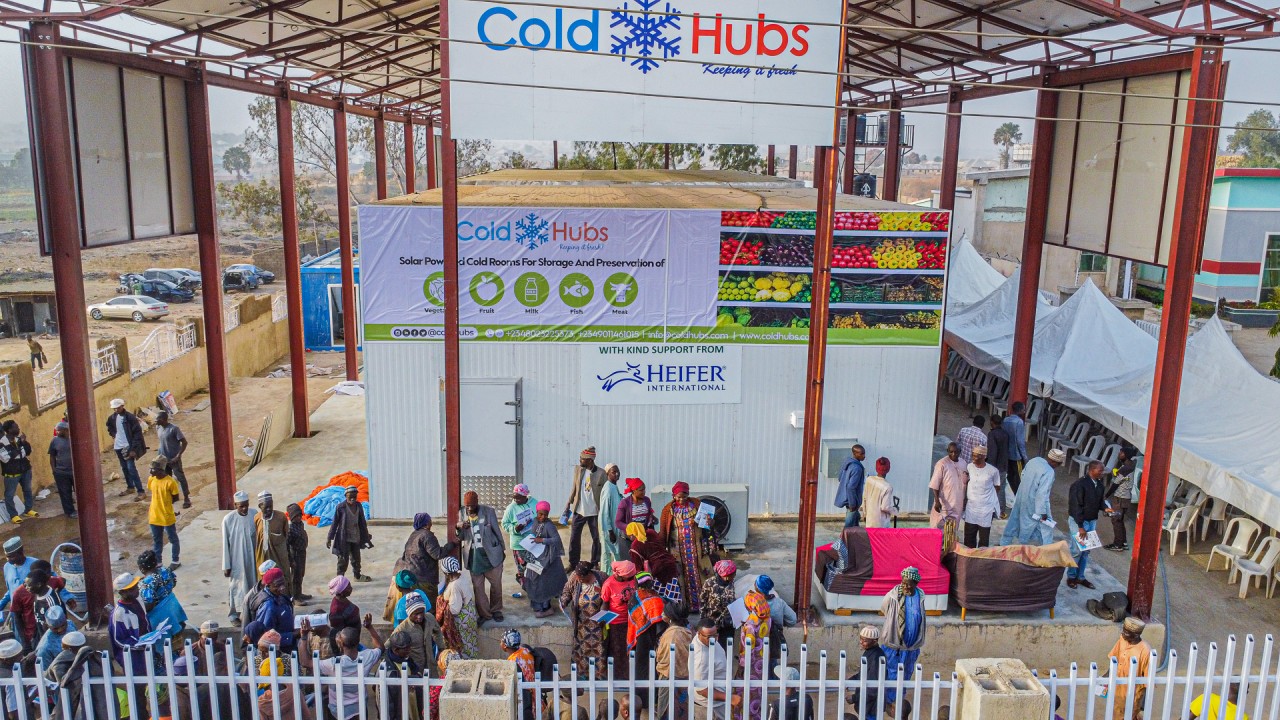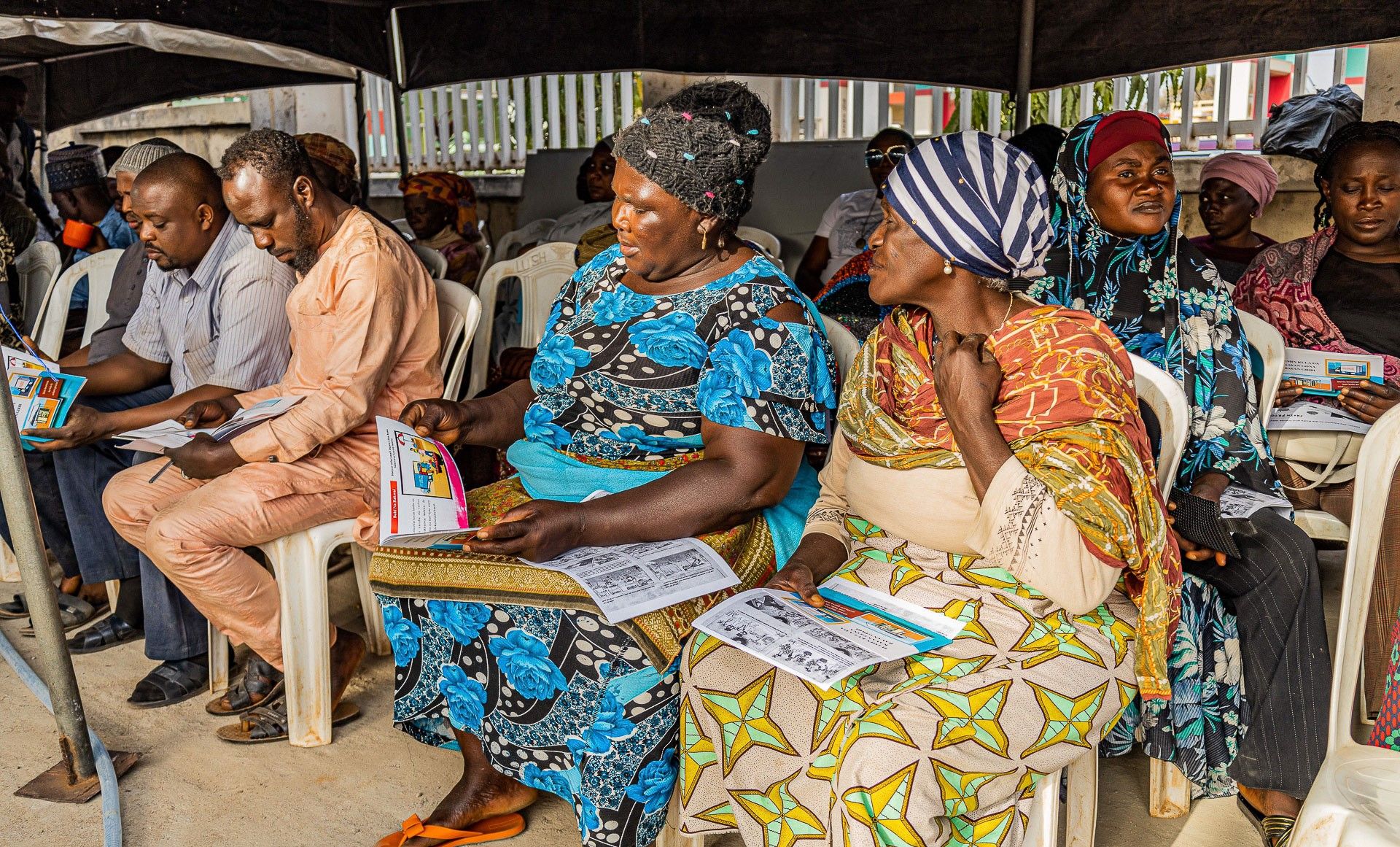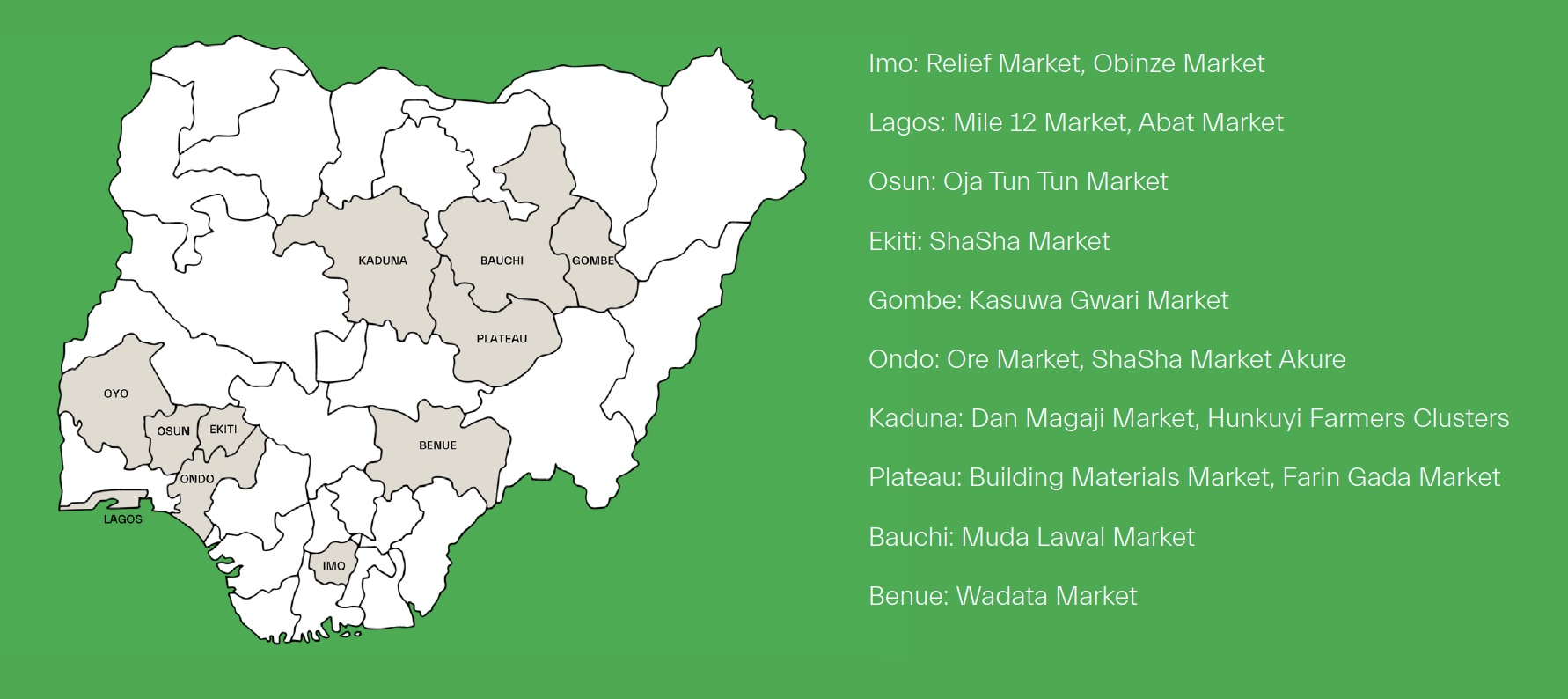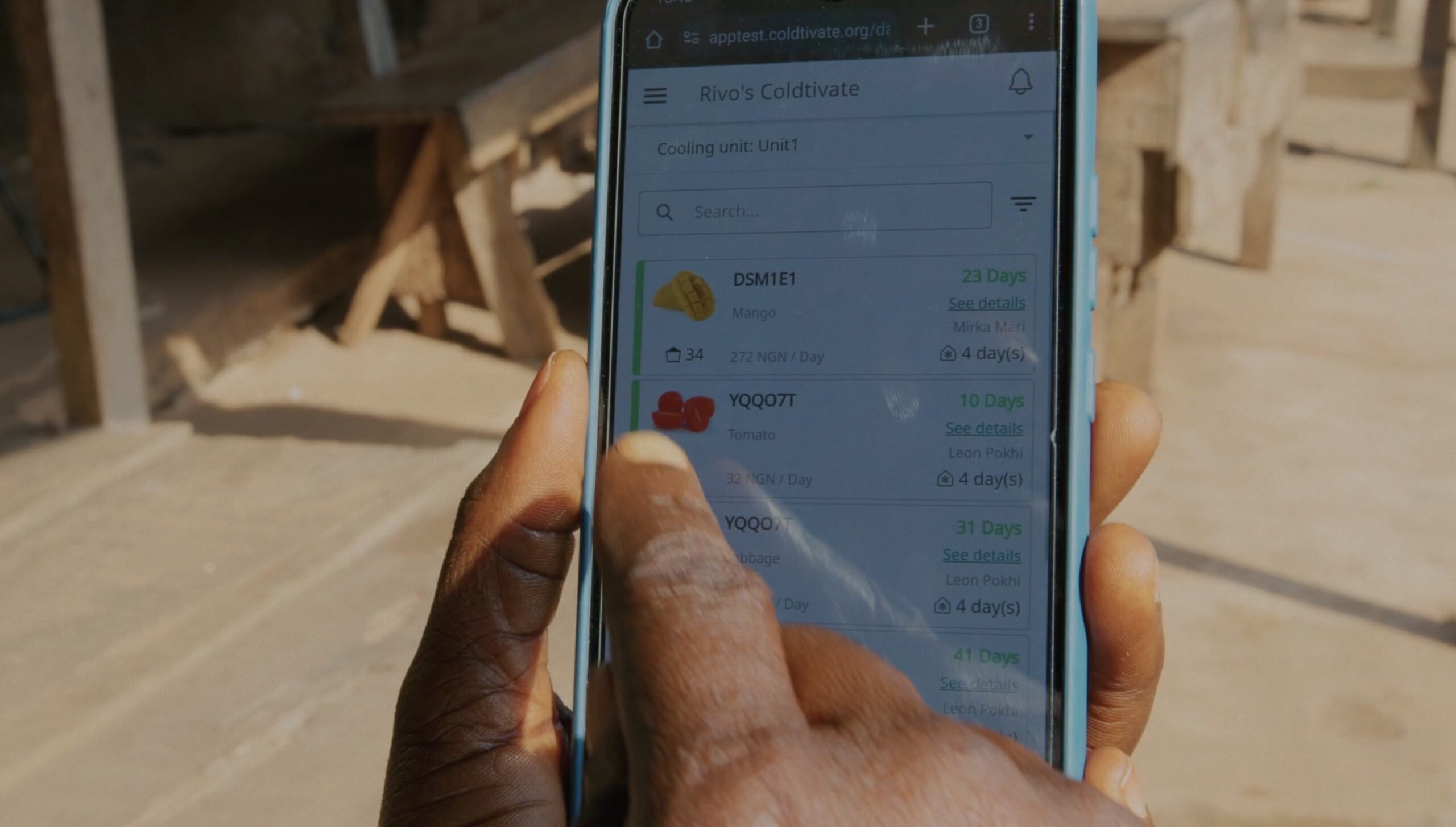A Fresh Approach to Nigerian Agriculture
Region
Pan-Nigeria
Most commonly stored crops:
Beans, Bell Pepper, Carrot, Tomato
-
Cold Room Size:
3 MT to 100 MT
-
Numbers of Coldtivate Pilots:
15
-
Number of Unique Users:
240
-
Total number of Check-in and Check-out Cycles:
1,366
Three lives and a common thread
Mmasichukwu's daily routine is gruelling. She wakes before dawn to prepare food for her family, then travels to a nearby farm to gather Ugu leaves.
After a 15-kilometre round trip, she heads to the market to sell the leaves. Whatever remains unsold is discarded. This cycle repeats every market day, leaving Mmasichukwu trapped in a relentless struggle for survival.
Doris manages onions shipped from Jos, Plateau State, hundreds of kilometres away. By the time they arrive, a third are damaged. She sorts the rest, selling lower-quality onions for NGN 500 (USD 0.63) per kg instead of NGN 1000 (USD 1.3).
Whatever remains unsold is stored indoors to slow deterioration, but price reductions are inevitable, eating into her profits.
After a 15-kilometre round trip, she heads to the market to sell the leaves. Whatever remains unsold is discarded. This cycle repeats every market day, leaving Mmasichukwu trapped in a relentless struggle for survival.
Doris manages onions shipped from Jos, Plateau State, hundreds of kilometres away. By the time they arrive, a third are damaged. She sorts the rest, selling lower-quality onions for NGN 500 (USD 0.63) per kg instead of NGN 1000 (USD 1.3).
Whatever remains unsold is stored indoors to slow deterioration, but price reductions are inevitable, eating into her profits.
Bose's life changed after her mother's death. Once selling vegetables together, she now struggles alone, taking on odd jobs like cleaning and helping others sell crops to make ends meet.
While studies indicate that farmers face a 15 percent reduction in their incomes due to post-harvest loss, a more alarming scenario emerges from one of the few targeted studies conducted in Nigeria. In Osun state, tomato growers saw a drastic reduction in the percentage of gross profit margin attributed to losses, dropping from 82 percent to 17 percent in 2014.
Mmasichukwu, Doris, Bose, and other farmers and traders find solutions to their post-harvest problems at ColdHubs, Nigeria’s largest provider of cold rooms as a service, where they discover solutions to their challenges.
While studies indicate that farmers face a 15 percent reduction in their incomes due to post-harvest loss, a more alarming scenario emerges from one of the few targeted studies conducted in Nigeria. In Osun state, tomato growers saw a drastic reduction in the percentage of gross profit margin attributed to losses, dropping from 82 percent to 17 percent in 2014.
Mmasichukwu, Doris, Bose, and other farmers and traders find solutions to their post-harvest problems at ColdHubs, Nigeria’s largest provider of cold rooms as a service, where they discover solutions to their challenges.
The Origins
ColdHubs was founded by Nnaemeka Ikegwuonu, a former radio show host committed to promoting farming best practices and market price transparency. Despite improvements in on-farm processes and increased yield, crops were spoiling rapidly after harvesting due to the absence of adequate storage options. Recognising the lack of access to cooling facilities among small-scale farmers, Ikegwuonu set out to tackle the problem.
In 2015, ColdHubs introduced a walk-in cold room with a window unit air conditioner, touring it across 11 states to raise awareness among farmers about this innovative technology. While farmers welcomed the innovation, concerns arose about their ability to maintain the cold rooms over time. Hence, the concept of Cooling-as-a-Service (CaaS) was born.
ColdHubs offered to own, maintain, and upgrade the cold rooms for farmers in exchange for a storage fee of NGN 200 (USD 0.25) per crate (20 kgs) per day. This approach empowered farmers with access to temperature-controlled storage solutions without the burden of investing in the equipment and taking care of its maintenance, revolutionising the agricultural landscape in Nigeria. A decade later, ColdHubs operates 58 solar-powered cold rooms of 3 and 10 metric tonnes across 28 states of Nigeria.
As recently as 2023, ColdHubs has expanded its infrastructure, introducing one 10-metric-tonne cold room and two 100-metric-tonne cold rooms.
In 2015, ColdHubs introduced a walk-in cold room with a window unit air conditioner, touring it across 11 states to raise awareness among farmers about this innovative technology. While farmers welcomed the innovation, concerns arose about their ability to maintain the cold rooms over time. Hence, the concept of Cooling-as-a-Service (CaaS) was born.
ColdHubs offered to own, maintain, and upgrade the cold rooms for farmers in exchange for a storage fee of NGN 200 (USD 0.25) per crate (20 kgs) per day. This approach empowered farmers with access to temperature-controlled storage solutions without the burden of investing in the equipment and taking care of its maintenance, revolutionising the agricultural landscape in Nigeria. A decade later, ColdHubs operates 58 solar-powered cold rooms of 3 and 10 metric tonnes across 28 states of Nigeria.
As recently as 2023, ColdHubs has expanded its infrastructure, introducing one 10-metric-tonne cold room and two 100-metric-tonne cold rooms.
In these new rooms, ColdHubs is shifting to new technology, called Design 2.0. ColdHubs 2.0 marks a departure from the previous mono-block refrigeration system, which consolidated all cooling components into a single unit and relied on battery storage for energy. Instead, Design 2.0 embraces split unit refrigeration, comprising six distinct components:
- Condensing unit
- Evaporator unit
- Blower
- Ice tank with ice packs
- Air duct with damper
- Control switch
This new design stores energy in ice, offering a more sustainable approach to cooling. Additionally, seven ice points have been attached to the cold rooms, which operate on the additional solar energy generated by photovoltaics. These facilities have benefited farmers and traders like Mmasichukwu and Doris, along with 9,775 other customers, including distributors and other actors in the food supply chain. The customers stored over 3 million kilograms of produce in 2023 alone. In addition to providing CaaS, ColdHubs conducts educational campaigns to educate farmers on various topics such as seed quality, plant diseases, and post-harvest crop management. These efforts aim to ensure that high-quality crops reach the market, and farmers earn an income commensurate with work and resources invested.
- Condensing unit
- Evaporator unit
- Blower
- Ice tank with ice packs
- Air duct with damper
- Control switch
This new design stores energy in ice, offering a more sustainable approach to cooling. Additionally, seven ice points have been attached to the cold rooms, which operate on the additional solar energy generated by photovoltaics. These facilities have benefited farmers and traders like Mmasichukwu and Doris, along with 9,775 other customers, including distributors and other actors in the food supply chain. The customers stored over 3 million kilograms of produce in 2023 alone. In addition to providing CaaS, ColdHubs conducts educational campaigns to educate farmers on various topics such as seed quality, plant diseases, and post-harvest crop management. These efforts aim to ensure that high-quality crops reach the market, and farmers earn an income commensurate with work and resources invested.
Community First
In ColdHubs’ modus operandi, community engagement isn’t just a ‘nice-to-have’; it’s a guiding principle. ColdHubs trains members of the local community to serve as cold room operators, entrusted with the crucial tasks of checking crates in and out, maintaining room sanitation, and educating farmers on the importance of post-harvest cooling.
All cold rooms are managed by women, a deliberate move to challenge traditional gender roles in agriculture: despite their active involvement in fieldwork, women are frequently excluded from the process of commercialising crops and receiving their rightful share of the profits.
ColdHubs partners with local female market leaders, known as Iya Oja in Nigeria’s Yoruba region, to find candidates like Bose who may be facing socio-economic challenges or violence. The cold rooms are strategically placed in safe, public locations like markets for physical accessibility. Having female operators enhances their cultural accessibility, especially for female farmers who otherwise face restrictions due to cultural norms around mobility.
All cold rooms are managed by women, a deliberate move to challenge traditional gender roles in agriculture: despite their active involvement in fieldwork, women are frequently excluded from the process of commercialising crops and receiving their rightful share of the profits.
ColdHubs partners with local female market leaders, known as Iya Oja in Nigeria’s Yoruba region, to find candidates like Bose who may be facing socio-economic challenges or violence. The cold rooms are strategically placed in safe, public locations like markets for physical accessibility. Having female operators enhances their cultural accessibility, especially for female farmers who otherwise face restrictions due to cultural norms around mobility.
ColdHubs' Sales and Marketing team engages with women at local markets to understand their unique challenges. Separate sessions for women and men reveal specific hurdles, with women more comfortable discussing issues in female-only settings. Later, joint gender programs promote knowledge sharing and highlight women's roles in agriculture and economic development.
The team, comprising regional representatives, focuses on cultural and power dynamics while linking capacity-building to broader social transformation in farming communities. In 2023, ColdHubs trained 3,400 farmers on post-harvest management and created over 100 jobs for women.
From 2022 to 2023, users of ColdHubs saw their average monthly income double from USD 60 to USD 120, thanks to improved crop storage and delayed sales. The switch from diesel to solar power reduced food waste and avoided nearly 3,932,560 kilograms of CO2 emissions.
The team, comprising regional representatives, focuses on cultural and power dynamics while linking capacity-building to broader social transformation in farming communities. In 2023, ColdHubs trained 3,400 farmers on post-harvest management and created over 100 jobs for women.
From 2022 to 2023, users of ColdHubs saw their average monthly income double from USD 60 to USD 120, thanks to improved crop storage and delayed sales. The switch from diesel to solar power reduced food waste and avoided nearly 3,932,560 kilograms of CO2 emissions.
Digital Revolution
In 2021, the Your Virtual Cold Chain Assistant (VCCA) team assessed ColdHubs’ facilities to explore how a digital tool could enhance cold room management and complement their servitisation business model. Since then, Coldtivate has been piloted in 14 ColdHubs rooms, with 240 unique users including smallholder farmers and small-scale traders.
Nnaemeka Chidiebere Ikegwuonu, CEO of ColdHubs, notes, “As we expand, we’re focusing on digitalizing our operations. The Your VCCA project has provided Coldtivate, an all-in-one tool for inventory management and customer updates. We’re integrating Coldtivate as a crucial training component for hub operators.”
Previously, operators used manual registration manuals for check-ins and check-outs, which led to untapped valuable data and cumbersome tasks like crate inspections, cross-referencing, and fee calculations. Feedback from operators, who found manual processes challenging, led to the creation of Coldtivate.
Coldtivate simplifies the process by registering new farmers and tracking crates, using temperature sensors and harvest dates to calculate the remaining storage life of fruits through digital twins developed by Empa. This innovation leverages sensor data to optimize storage management.
Farmers with smartphones can track storage days via the app, while those with feature phones receive SMS notifications. Operators contact those without phones in person. During check-out, the app calculates charges, generates receipts, and records payment methods.
Nnaemeka Chidiebere Ikegwuonu, CEO of ColdHubs, notes, “As we expand, we’re focusing on digitalizing our operations. The Your VCCA project has provided Coldtivate, an all-in-one tool for inventory management and customer updates. We’re integrating Coldtivate as a crucial training component for hub operators.”
Previously, operators used manual registration manuals for check-ins and check-outs, which led to untapped valuable data and cumbersome tasks like crate inspections, cross-referencing, and fee calculations. Feedback from operators, who found manual processes challenging, led to the creation of Coldtivate.
Coldtivate simplifies the process by registering new farmers and tracking crates, using temperature sensors and harvest dates to calculate the remaining storage life of fruits through digital twins developed by Empa. This innovation leverages sensor data to optimize storage management.
Farmers with smartphones can track storage days via the app, while those with feature phones receive SMS notifications. Operators contact those without phones in person. During check-out, the app calculates charges, generates receipts, and records payment methods.
During the pilots, ColdHubs needed better monitoring of room usage and finances. Your VCCA responded by adding screens to Coldtivate that display utilisation and financial statistics, with data available for download in CSV format. The app now tracks all check-ins and check-outs, revenue, food loss avoided, income increases, and CO2 reductions.
Farmers with smartphones receive weekly notifications to complete surveys on crop sales and losses, while operators survey their customers. This data helps measure income increases and post-harvest loss reductions and will refine the app's market price prediction model, which forecasts prices using historical and open-source data.
Coldtivate is user-friendly, with simple icons and colours for easy navigation—red indicates immediate withdrawal, yellow and green signal impending or ample time for withdrawal. In-app notifications remind farmers to withdraw their crates. The app is free, available in local languages (Igbo, Yoruba, and soon Hausa), and designed for ease of use.
Operators receive comprehensive training during onboarding and ongoing support from ColdHubs’ team. This builds digital skills and creates job opportunities. Feedback is used to enhance the app, including adapting surveys to local measurement practices like baskets or sacks.
Farmers with smartphones receive weekly notifications to complete surveys on crop sales and losses, while operators survey their customers. This data helps measure income increases and post-harvest loss reductions and will refine the app's market price prediction model, which forecasts prices using historical and open-source data.
Coldtivate is user-friendly, with simple icons and colours for easy navigation—red indicates immediate withdrawal, yellow and green signal impending or ample time for withdrawal. In-app notifications remind farmers to withdraw their crates. The app is free, available in local languages (Igbo, Yoruba, and soon Hausa), and designed for ease of use.
Operators receive comprehensive training during onboarding and ongoing support from ColdHubs’ team. This builds digital skills and creates job opportunities. Feedback is used to enhance the app, including adapting surveys to local measurement practices like baskets or sacks.
What does the future hold?
Cold room utilisation can be low when farmers face uncertainty about produce sales. While waiting for better market prices is ideal, it’s often impractical, leading many farmers to sell crops immediately to address urgent financial needs.
To address this, ColdHubs has partnered with Heifer International to set up one 10-metric-tonne and two 100-metric-tonne cold rooms. These facilities enable retailers and supply chain actors like ShopRite and Spar to buy and store goods longer, improving market access for farmers.
In the future, these larger cold rooms could help small traders by supplying fresh produce via ColdHubs' refrigerated trucks. This initiative aims to prevent crop spoilage and preserve economic and nutritional value, as seen in Doris's situation.
To address this, ColdHubs has partnered with Heifer International to set up one 10-metric-tonne and two 100-metric-tonne cold rooms. These facilities enable retailers and supply chain actors like ShopRite and Spar to buy and store goods longer, improving market access for farmers.
In the future, these larger cold rooms could help small traders by supplying fresh produce via ColdHubs' refrigerated trucks. This initiative aims to prevent crop spoilage and preserve economic and nutritional value, as seen in Doris's situation.
As the cold rooms continue to expand, the demand for Coldtivate grows, too. Imagine having to check for spoilage across the 5000 crates stored in the 100 MT room – an arduous and nearly impossible task. Coldtivate aids operators by informing them which crates must be checked out. To ensure the quality of the crates, the app tracks the shelf-life of the crops as they move from one cold room to another and even during transportation in the trucks until they reach the traders or the final market.
Moving forward, Coldtivate aims to enhance its capabilities further by enabling operators to map the cold room and pinpoint the exact location of the crate to be checked out. Further, it aims to streamline the check-in and check-out process through crates code scanning for increased efficiency.
Moving forward, Coldtivate aims to enhance its capabilities further by enabling operators to map the cold room and pinpoint the exact location of the crate to be checked out. Further, it aims to streamline the check-in and check-out process through crates code scanning for increased efficiency.
Funding
Your VCCA in Nigeria is supported by the Fund for the Promotion of Innovation in Agriculture (i4Ag), commissioned by the Federal Ministry for Economic Cooperation and Development (BMZ). The project is being carried out by the BASE Foundation and Empa on behalf of Deutsche Gesellschaft für Internationale Zusammenarbeit (GIZ) GmBH.
The development of Coldtivate's Impact Dashboard has been funded by the Climate Ledger Initiative, supported by the Swiss Agency for Development and Cooperation.
Join us!
Join us!
Join us!
Join us!
Join us!
Join us!
Join us!
Join us!
Join us!
Join us!
Join us!
Join us!
Join us!
Join us!
Join us!
Join us!
Join us!
Join us!
Join us!
Join us!
Join us!
Join us!
Join us!
Join us!
Join us!
Join us!
Join us!
Join us!
Join us!
Join us!
Join us!
Join us!
Join us!
Join us!
Join us!
Join us!
Join us!
Join us!
Join us!
Join us!
Join us!
Join us!
Join us!
Join us!
Join us!
Join us!
Join us!
Join us!
Join us!
Join us!
Join us!
Join us!
Join us!
Join us!
Join us!
Join us!
Join us!
Join us!
Join us!
Join us!
Join us!
Join us!
Join us!
Join us!
Join us!
Join us!
Join us!
Join us!
Join us!
Join us!
Join us!
Join us!
Join us!
Join us!
Join us!
Join us!
Join us!
Join us!
Join us!
Join us!
Join us!
Join us!
Join us!
Join us!
Join us!
Join us!
Join us!
Join us!
Join us!
Join us!
Join us!
Join us!
Join us!
Join us!
Join us!
Join us!
Join us!
Join us!
Join us!
Join us!
Join us!
Join us!
Join us!
Join us!
Join us!
Join us!
Join us!
Join us!
Join us!
Join us!
Join us!
Join us!
Join us!
Join us!
Join us!
Join us!




